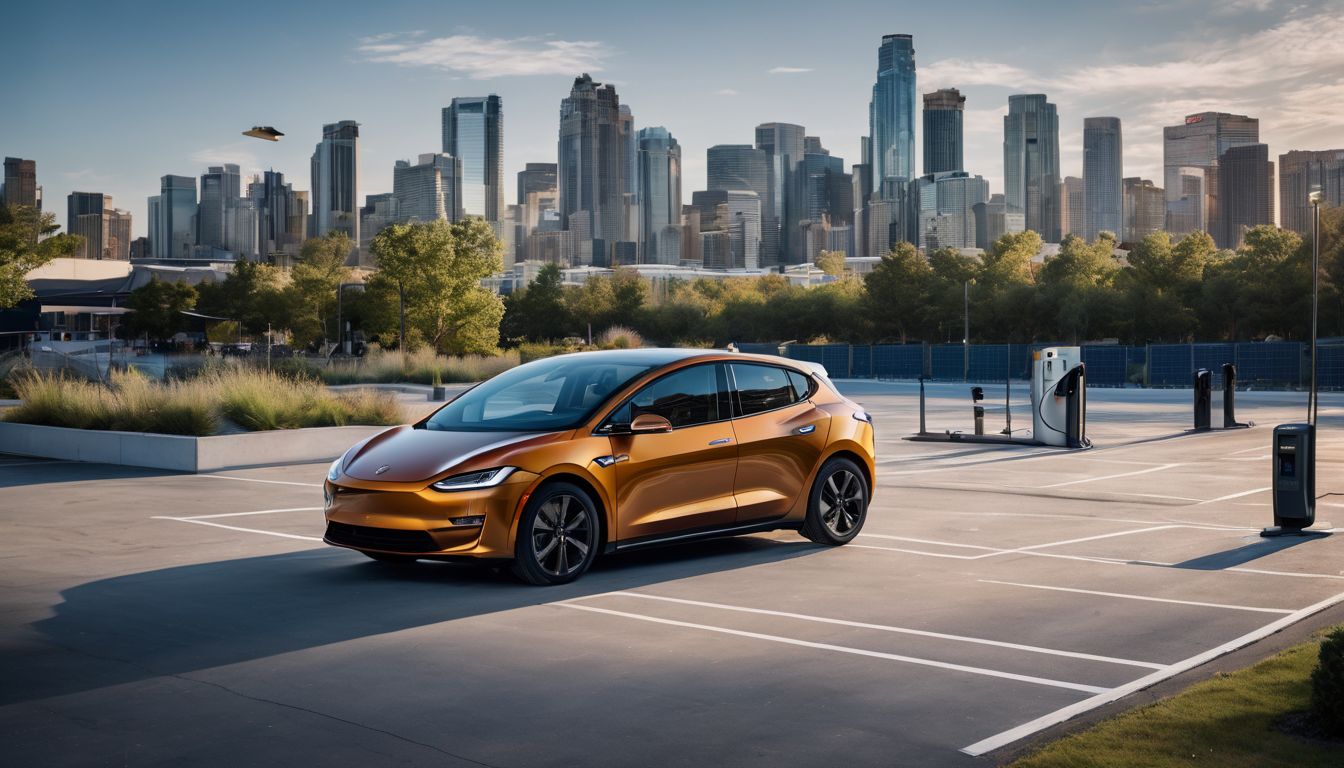We’re all keenly aware of the pressing environmental issues our dear planet is grappling with at this moment in time. These aren’t distant problems; they are real, tangible challenges that affect each and every one of us.
It’s hardly surprising to learn that transport is responsible for around a quarter of global CO2 emissions from fuel combustion – a significant statistic indeed. Our forthcoming article endeavours to delve into the latest automotive innovations which promise to guide us down a more sustainable path.
Together, let’s navigate our way towards meaningful change for the health of our world!
Key Takeaways
- Government policies and consumer expectations are pushing car makers to produce vehicles that pollute less and help clear up our skies.
- Electric cars are becoming more popular, which is great because they don’t rely on fossil fuels and keep the air cleaner.
- People buying cars now care a lot about how their choices affect the planet, making companies think more about how they can reduce harm to nature in their designs.
- Big issues like global warming and running out of natural resources mean car companies have to be smart with how they make their vehicles from now on.
- Working together with governments and other businesses helps the car industry come up with new ways to make driving kinder to the environment.
Government Interventions and Automotive Innovations
Government interventions, such as emissions standards and the push for electric vehicles, are driving automotive innovations towards more sustainable practices. These initiatives have a direct impact on reducing carbon emissions and promoting environmental responsibility within the automotive industry.
Impact of Emissions Standards
We see governments worldwide setting strict emissions standards to curb pollution from cars and trucks. These regulations force automotive companies to innovate or face hefty fines.
As a result, newer vehicles release fewer pollutants into the air, making our cities cleaner and healthier places to live.
This shift towards tighter emission control is also speeding up the development of energy-efficient vehicles. Manufacturers are investing more in green technology, crafting cars that use less fuel and emit less carbon dioxide.
This push for sustainable manufacturing isn’t just good news for our planet – it lowers fuel costs for drivers too, hitting two birds with one stone.
Push for Electric Vehicles
The push for electric vehicles continues to gain momentum as the automotive industry responds to the call for sustainable transportation solutions. Governments, along with environmentally conscious individuals, are advocating for the widespread adoption of electric vehicles to reduce carbon emissions from automobiles.
This shift towards energy-efficient and eco-friendly automobiles aligns with the demand for sustainable practices and emphasises the environmental impact of automotive innovations.
As a result, manufacturers are investing in green automotive technology and renewable energy vehicles to address climate change and contribute to a cleaner, more sustainable future.
Electric vehicle impact on the environment is a key consideration driving the transition from traditional fuel-powered cars to clean energy vehicles. The development and promotion of electric car models play a pivotal role in reducing environmental effects caused by conventional automobiles.
Changing Expectations in the Automotive Industry
There is a growing demand for sustainable practices in the automotive industry, with consumers placing emphasis on environmental impact. This shift in expectations is driving automakers to innovate and develop eco-friendly automobiles.
Demand for Sustainable Practices
Consumers today are increasingly demanding sustainable practices from the automotive industry. They expect manufacturers to minimise their environmental impact, from energy sources management to manufacturing processes.
As environmentally conscious individuals, they seek eco-friendly automobiles and vehicles with minimal emissions. This demand has prompted the automotive industry to focus on developing energy-efficient vehicles and implementing sustainable manufacturing processes.
Moreover, there is a growing emphasis on environmental impact assessment throughout the lifecycle of automobiles. From design and production to usage and disposal, consumers expect companies to integrate sustainability into every aspect of their operations.
Emphasis on Environmental Impact
Consumers are now driving the automotive industry towards emphasising environmental impact. They demand vehicles that not only meet their transportation needs but also adhere to eco-friendly standards.
As a result, manufacturers are innovating with sustainable materials and energy-efficient technologies, capitalising on the escalating concern for the planet.
Automotive sustainability has become a vital focus to address climate crisis and resource depletion. The push for eco-friendly automobiles is prompting technological advancements in electric vehicles and other green technology solutions.
Megatrends Driving Sustainable Change
The increasing urgency of the climate crisis, coupled with the depletion of natural resources and advancements in technology, are driving significant changes towards sustainable practices within the automotive industry.
These megatrends are shaping how automobile manufacturers approach design, production, and their overall impact on the environment.
Climate Crisis
The climate crisis poses a significant threat to our planet, affecting ecosystems, weather patterns, and overall environmental stability. Rising global temperatures, extreme weather events, and sea-level rise are among the urgent issues we face due to climate change.
The impact of automotive emissions on this crisis cannot be overstated; the continued reliance on fossil fuels for transportation contributes significantly to greenhouse gas emissions, exacerbating the climate crisis.
As environmentally conscious individuals concerned about conservation and sustainability, it is crucial for us to support initiatives that aim to address this pressing issue.
Resource Depletion
The ongoing demand for automotive innovation has significantly contributed to resource depletion. The ever-increasing production of vehicles, coupled with the extraction of raw materials such as fossil fuels and metals, has led to a substantial decline in natural resources.
As a result, it is crucial for the automotive industry to adopt sustainable practices that reduce resource consumption and minimise the impact on the environment. This shift towards eco-friendly automobiles is essential in addressing the challenge of resource depletion while ensuring a more sustainable future for generations to come.
In response to megatrends driving sustainable change like climate crisis and technological advancements, the automotive industry must focus on developing energy-efficient vehicles that rely less on scarce resources.
Technological Advancements
Technological advancements in the automotive industry are pivotal in driving sustainable change. Advanced engineering and design have led to the development of eco-friendly automobiles that significantly reduce emissions and environmental impact.
Energy-efficient vehicles, alongside innovations in green technology, demonstrate the industry’s commitment to addressing climate crisis concerns and resource depletion. These developments align with our shared goal of achieving a more sustainable future, marking a positive shift towards greener transportation options and reduced environmental effects.
The ongoing focus on technological advancements has also paved the way for increased collaboration between government bodies, the automotive industry, and other sectors. This partnership fosters an environment conducive to nurturing further innovation and progress towards achieving a more eco-conscious approach to automotive practices.
The Role of the Automotive Industry in Achieving a Sustainable Future
The automotive industry plays a crucial role in achieving a sustainable future through the development and implementation of green technology. By prioritising sustainability, the industry can collaborate with government and other sectors to make significant strides towards environmental preservation.
Strategies for Balancing Bottom Line with Green Line
To balance the bottom line with the green line, automotive companies can invest in research and development of eco-friendly technologies. Implementing sustainable manufacturing processes and materials will contribute to a reduced environmental impact.
Collaborating with government bodies and other industries to promote sustainability initiatives can drive positive change. Additionally, by incorporating energy-efficient vehicles into their product offerings, automotive companies can meet consumer demand for eco-friendly automobiles.
Innovative strategies that prioritise both profitability and environmental responsibility are crucial for long-term success. This approach aligns business goals with the growing emphasis on sustainability within the automotive industry, fostering positive outcomes for the planet and society as a whole.
Benefits of Sustainability for Business Success
Sustainability enhances business success by reducing operational costs and enhancing brand reputation. Implementing eco-friendly practices, such as energy-efficient vehicles or investing in green technologies, can lead to long-term cost savings and improved efficiency.
Embracing sustainable strategies also resonates with environmentally conscious consumers, leading to increased customer loyalty and market share.
Furthermore, demonstrating a commitment to sustainability may attract top talent who are motivated to work for socially responsible companies. By prioritising sustainability, businesses can create a positive impact on the environment while driving their own success in the competitive marketplace.
Innovations in Green Technology
Having discussed the business benefits of sustainability, let’s now delve into the innovations in green technology that are driving change in the automotive industry. Cutting-edge advancements such as electric vehicles, energy-efficient technologies and eco-friendly materials are revolutionising automobile design and manufacturing.
These innovations not only reduce harmful emissions but also enhance fuel efficiency, ultimately contributing to a more sustainable environment.
The development of energy-efficient vehicles and eco-friendly automobiles has significantly reduced environmental effects associated with traditional automotive advancements. This shift towards greener technology aligns with the growing demand for sustainable practices in the industry, marking a critical step towards achieving automotive sustainability.
Collaboration with Government and Other Industries
- Developing environmentally – friendly policies together to reduce emissions.
- Sharing technology and resources aimed at creating energy – efficient vehicles.
- Jointly investing in research and development for eco – friendly automobiles.
- Supporting regulatory measures that incentivise the production of electric vehicles.
- Advocating for green technology adoption across various industries to address environmental effects of automotive advancements.
Conclusion
In conclusion, automotive innovations have a significant impact on the environment. Regulations and consumer demand are driving the development of energy-efficient and eco-friendly vehicles.
The automotive industry’s role in achieving a sustainable future is crucial. With collaboration and advancements in green technology, it can contribute to a more environmentally friendly future for all.
FAQs
1. What impact do energy-efficient vehicles have on the environment?
Energy-efficient vehicles reduce pollution by using less fuel and releasing fewer emissions, helping protect our environment.
2. Are eco-friendly automobiles really better for the planet?
Yes, eco-friendly automobiles are designed to have a lower impact on the environment, often with features like reduced emissions that contribute to cleaner air.
3. How do environmental regulations affect automobile innovation?
Environmental regulations push car manufacturers to create innovations that make cars more sustainable and lessen their impact on nature.
4. What’s Electric Vehicle’s role in shaping our environmental future?
Electric vehicle development is key because they rely on clean energy sources instead of fossil fuels, leading towards a greener future with less air pollution.





